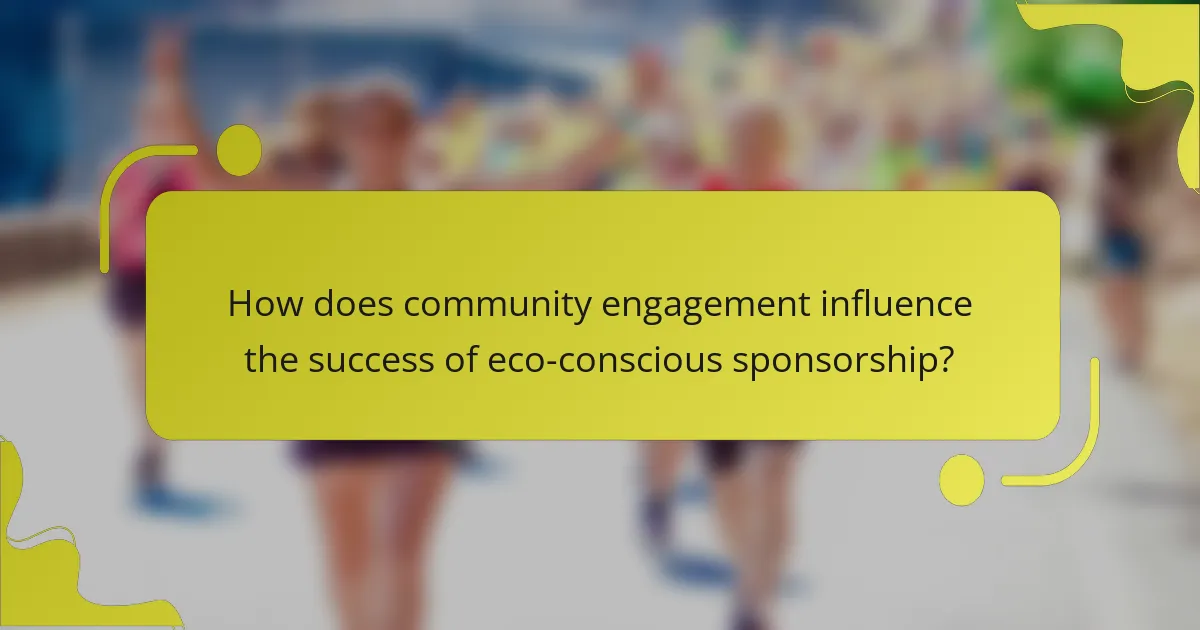Eco-conscious sponsorship enhances brand reputation and fosters customer loyalty while positively impacting communities. This article explores effective strategies for implementing eco-conscious sponsorship, the importance of community engagement, and the unique attributes that differentiate successful campaigns. By aligning with environmentally responsible practices, companies can build trust and credibility with stakeholders.

What are the key advantages of eco-conscious sponsorship?
Eco-conscious sponsorship offers multiple advantages, including enhanced brand reputation, increased customer loyalty, and positive community impact. These benefits stem from aligning with environmentally friendly practices and values. Companies that engage in eco-conscious sponsorship often see improved stakeholder relationships and greater market differentiation. Ultimately, this approach fosters a sustainable brand image that resonates with consumers.
How does eco-conscious sponsorship enhance brand reputation?
Eco-conscious sponsorship significantly enhances brand reputation by aligning corporate values with environmental responsibility. This alignment fosters trust among consumers, leading to increased loyalty and positive brand perception. Brands that engage in eco-conscious sponsorship often attract environmentally aware audiences, boosting their market presence. Additionally, such initiatives can improve stakeholder relationships and attract partnerships with like-minded organizations. By showcasing commitment to sustainability, brands can differentiate themselves in competitive markets, ultimately enhancing their overall reputation.
Which financial benefits can arise from eco-conscious sponsorship?
Eco-conscious sponsorship can lead to significant financial benefits, including enhanced brand loyalty and increased market share. Companies that engage in sustainable practices often attract environmentally aware consumers, leading to higher sales. As a result, businesses can enjoy improved public perception and potentially lower operational costs through efficient resource use. Additionally, eco-friendly initiatives can open doors to new partnerships and funding opportunities, contributing to long-term financial growth.
Why do consumers prefer brands that engage in eco-conscious sponsorship?
Consumers prefer brands that engage in eco-conscious sponsorship due to a growing awareness of sustainability. Brands that support environmental initiatives resonate with consumers’ values, fostering loyalty and trust. Additionally, eco-conscious sponsorship often enhances brand reputation and attracts a demographic that prioritises ethical consumption. Studies show that 66% of global consumers are willing to pay more for sustainable brands, indicating a strong preference for companies that demonstrate social responsibility. This alignment between consumer values and brand actions creates a competitive advantage in the marketplace.

What strategies can organizations implement for effective eco-conscious sponsorship?
Organizations can implement several strategies for effective eco-conscious sponsorship. Prioritise partnerships with environmentally responsible brands to align values. Engage in community initiatives that promote sustainability, such as tree planting or recycling drives. Utilize digital platforms to raise awareness about eco-friendly practices and showcase sponsorship impact. Measure and report on sustainability outcomes to build trust and credibility with stakeholders.
How can businesses identify suitable eco-conscious partners?
Businesses can identify suitable eco-conscious partners by assessing their sustainability practices and values. Start by researching potential partners’ commitment to environmental initiatives. Evaluate their certifications, such as ISO 14001 or B Corp status, which indicate adherence to eco-friendly standards. Additionally, analyse their supply chain transparency and community engagement efforts. Consider their track record in reducing carbon footprints and promoting sustainable products. This thorough evaluation ensures alignment with eco-conscious goals, fostering meaningful partnerships.
What role does transparency play in eco-conscious sponsorship?
Transparency fosters trust and accountability in eco-conscious sponsorship. It enables brands to communicate their sustainability practices effectively, ensuring stakeholders understand their environmental impact. By openly sharing information about sourcing, production, and community initiatives, brands enhance their credibility. This transparency attracts consumers who prioritise ethical practices, ultimately driving engagement and loyalty. Furthermore, it encourages collaboration among sponsors, non-profits, and communities, amplifying positive environmental outcomes.
Which marketing channels are most effective for promoting eco-conscious sponsorship?
Social media, content marketing, and influencer partnerships are the most effective channels for promoting eco-conscious sponsorship. These platforms allow brands to engage authentically with their audience while showcasing their commitment to sustainability.
Social media channels like Instagram and Facebook offer visual storytelling opportunities, highlighting eco-friendly initiatives. Content marketing through blogs and videos can educate consumers about sustainability efforts, enhancing brand credibility. Influencer partnerships leverage trusted voices to reach targeted audiences, amplifying messages about environmental responsibility.
Email marketing can also play a role, fostering direct communication with supporters and promoting eco-friendly events. Each channel contributes uniquely to building a community around eco-conscious values.

How does community engagement influence the success of eco-conscious sponsorship?
Community engagement significantly enhances the success of eco-conscious sponsorship by fostering trust and collaboration. Engaging local communities creates a sense of ownership and shared responsibility, leading to increased participation in sustainability initiatives. This collaboration often results in measurable outcomes, such as improved environmental practices and heightened brand loyalty. Additionally, companies that actively involve communities in their sponsorship efforts often enjoy positive public perception, which can amplify their marketing reach and effectiveness.
What are the best practices for fostering community involvement?
To foster community involvement effectively, organizations should prioritise transparency, collaboration, and sustainability. Engaging the community through eco-conscious sponsorship creates shared benefits and strengthens local ties.
1. Establish clear communication channels to share goals and progress.
2. Involve community members in decision-making processes, ensuring their voices are heard.
3. Organise events that promote environmental awareness and encourage participation.
4. Collaborate with local businesses and organizations to amplify efforts and resources.
5. Measure and showcase the impact of community involvement to build trust and motivation.
How can feedback from the community shape sponsorship initiatives?
Community feedback can significantly shape eco-conscious sponsorship initiatives by aligning them with public values and expectations. Engaging with the community fosters trust and enhances brand reputation. For instance, sponsors can gather insights on preferred sustainability practices, ensuring initiatives resonate with local concerns. This collaboration often leads to innovative strategies that reflect genuine community interests, ultimately enhancing the effectiveness of sponsorship efforts.

What unique attributes distinguish successful eco-conscious sponsorship campaigns?
Successful eco-conscious sponsorship campaigns are distinguished by their authenticity, alignment with brand values, and community involvement. Authenticity builds trust and engagement, ensuring that campaigns resonate with target audiences. Alignment with brand values ensures consistency in messaging and strengthens brand identity. Community involvement fosters local support and enhances the campaign’s impact, creating a sense of shared purpose. These unique attributes contribute to the overall effectiveness of eco-conscious sponsorship efforts.
Which case studies exemplify innovative eco-conscious sponsorship approaches?
Innovative eco-conscious sponsorship approaches are exemplified by brands like Patagonia, Unilever, and Coca-Cola. Patagonia’s “Don’t Buy This Jacket” campaign encourages sustainability. Unilever’s sustainable living brands focus on social responsibility. Coca-Cola’s partnerships with environmental organizations promote recycling initiatives. These case studies highlight effective strategies for community engagement and environmental impact.
How do cultural differences impact the perception of eco-conscious sponsorship?
Cultural differences significantly shape how communities perceive eco-conscious sponsorship. These perceptions influence engagement strategies and sponsorship effectiveness.
Cultural values dictate priorities regarding environmental issues. For instance, cultures with a strong emphasis on community may value local environmental initiatives more than global campaigns. Additionally, communication styles vary; direct messaging may resonate differently across cultures.
Understanding these nuances allows brands to tailor their sponsorship approaches. Companies can align their eco-conscious initiatives with local cultural values, enhancing community engagement. This alignment fosters trust and strengthens brand loyalty.
Incorporating cultural insights leads to more effective sponsorship strategies. Brands that recognize and adapt to cultural differences can better connect with their audiences, ensuring their eco-conscious efforts are perceived positively.

What rare attributes can enhance the effectiveness of eco-conscious sponsorship?
Rare attributes that can enhance the effectiveness of eco-conscious sponsorship include innovative partnerships, unique community engagement strategies, and exclusive eco-friendly product offerings. These attributes differentiate sponsorships and resonate with environmentally aware audiences. For example, collaborations with local environmental groups can create authentic connections. Additionally, offering limited-edition sustainable products can generate excitement and drive consumer interest. Such rare attributes foster deeper relationships and amplify the impact of eco-conscious initiatives.
How can exclusive partnerships amplify eco-conscious initiatives?
Exclusive partnerships can significantly amplify eco-conscious initiatives by enhancing resource sharing, increasing visibility, and fostering community engagement. Collaborations between brands and environmental organizations can pool expertise and funding, creating impactful projects. For instance, joint campaigns can leverage each partner’s audience, amplifying the message of sustainability. As a result, these partnerships can drive greater awareness and participation in eco-friendly practices.
Which unexpected outcomes can arise from eco-conscious sponsorship efforts?
Unexpected outcomes from eco-conscious sponsorship efforts can include brand loyalty, increased community engagement, and unexpected partnerships. These initiatives may also lead to heightened consumer expectations regarding sustainability practices. As a result, brands could face scrutiny and pressure to maintain their eco-friendly commitments. Additionally, there might be a shift in target demographics, attracting environmentally conscious consumers who prioritise sustainability in their purchasing decisions.
What are the common pitfalls to avoid in eco-conscious sponsorship?
Common pitfalls in eco-conscious sponsorship include lack of authenticity, insufficient research on environmental impact, neglecting community engagement, and failing to communicate effectively. Authenticity is crucial; brands must align their values with sustainable practices. Research is essential to ensure sponsorships genuinely benefit the environment. Community engagement fosters trust and collaboration, while effective communication ensures that the audience understands the brand’s commitment to sustainability. Avoiding these pitfalls strengthens the integrity and effectiveness of eco-conscious sponsorship initiatives.
What expert tips can maximize the impact of eco-conscious sponsorship?
To maximize the impact of eco-conscious sponsorship, focus on authentic partnerships, community involvement, and measurable outcomes. Engaging with local organizations enhances credibility and fosters trust. Highlight sustainability efforts through transparent communication, showcasing the positive environmental impact. Utilize social media to amplify reach and encourage community participation. Regularly assess and report on the effectiveness of initiatives to demonstrate commitment and attract further support.




